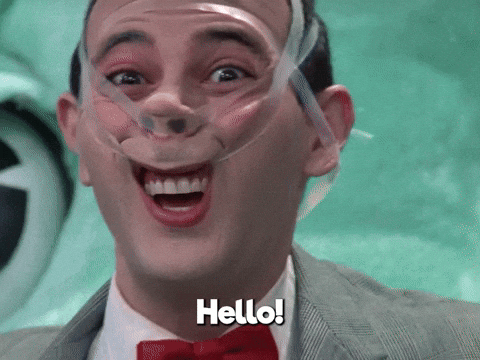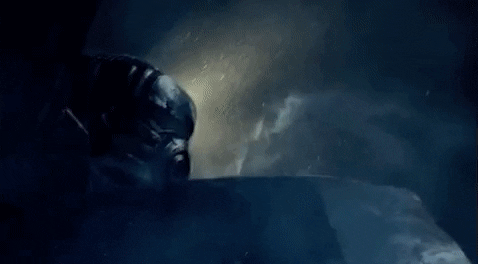In Which We are Weird, UnBrief, and Rather Crotchety
WN.07 \\ 07.08-14.24
Hello, weirdlings.
You may have noticed that GIFs are my second language. I adore them. A perfectly chosen GIF is a thing of beauty and a joy forever. This is my testimony.
En avant!!
Welcome to my off-weekly off-the-cuff review of efforts, insights, and whatevers in the last few days.
This week’s notes include thoughts on:
holding things loosely
writing concisely
creatures vs. machines1
The Liquidity of Life
When I initially planned this week, I realized that I’d somehow piled up several conversations and meetings alongside the scheduled workshop for this weekend. As an Enneagram Four with a strong Five wing,2 I felt myself quail a bit at the significant expenditure of energy.
As life does, the planned week became the unplanned, and then the replanned, week. Meetings shifted, schedules changed, expectations face-planted, and my energy tank found some fumes. The week became the latest embodiment of one of my personal maxims: “Obstacles are just suggestions for alternate routes.”
I found myself challenged to consider the weight I’d given to some of these plans, the outcomes I’d envisioned, which have either been delayed or eliminated entirely.
And it’s forced me to again consider what it is that I love, and who I am here to serve. (Hint: it’s not me.)
Brevity, Sweet Brevity
When you have an endless supply of paper (or pixels), it’s easy to just keep writing. To spill and spew and say with furbelows and flourishes and floundering paragraphs what could actually be said in a few well-chosen, carefully-placed sentences.3
Which is to say, it’s hard to write concisely!
In the latest on the book front: I realized that I was having a hard time making some decisions about where to take the outline and the proposal. So I gave myself the task of writing a concept statement, which needs to be done anyway, as basically the “elevator pitch.” But also as an exercise in just saying what the damn thing is about.
First, I drafted a 100-word statement.
You become who you watch.
Role models help us answer the question, "Who do I want to become?" Healthy role models are "equipment for living" - they show us how to become a fully flourishing human through reorienting our desires, making wise decisions, and changing our behaviors.
People Watching identifies time, proximity, congruity, and responsibility as four key factors that help us recognize, choose, and imitate healthy role models. In finding, and becoming, role models, we begin to overcome loneliness, cynicism, and stagnation and recover relational trust, social connection, and personal significance.
I like it. It touches on the major elements of my outline, signals a diagnosed problem, points toward proposed solutions, and situates the whole within the context of personal growth and improvement.4
Then I gave myself the task of whittling it down to fifty words.
Folks, I began to sweat blood. I felt keenly the old writing adage, “Kill your darlings.” Every word felt precious, vital, necessary. I persevered.
You become who you watch.
Healthy role models show us how to become a flourishing human through reorienting desires, making wise decisions, and changing behaviors.
People Watching identifies four factors in choosing and imitating healthy role models, thus gradually overcoming loneliness, cynicism, and stagnation and recovering relational trust, social connection, and personal significance.
I’m not sure I’m ready to cut any more words.5
But let me know: would you read this book?
The Who and the What
I recently stumbled on Ed Zitron’s newsletter, who lately has been on a tear against Big Tech, and hooo boy, is he scathing. Zitron’s latest essay goes into great detail about a recent report by Goldman Sachs that basically pokes all kinds of holes in the generative AI bubble. In sum,
“It's obvious. It's well-documented. Generative AI costs far too much, isn't getting cheaper, uses too much power, and doesn't do enough to justify its existence. There are no killer apps, and no killer apps on the horizon. And there are no answers.”
In the last year or so that AI has taken over all the things, I have found myself constantly wondering about the point of all these AI-app integrations - what are they for? I’ve got the sneaking suspicion that AI is an idea in search of a problem and a solution.
Every time I’m offered the use of AI in Notion, Miro, Spark Email, etc., I’m stymied by the fact that to get anything useful out of this tool, it requires me to input good prompts. It requires me to know specifically what outcomes I’m seeking before I even understand the questions I want to ask.
But here’s the thing: that whole sequence of typing in a question, reviewing the output, refining the parameters, reviewing the next iteration? That back-and-forth engagement of ideas and expressions?
That’s the creative process.
And I have not been able to figure out why we want to add the smoke screen of “generative AI” to this process, because the results I’ve seen so far do more to dumb us down and lower our standards of what’s good, creative, and fundamentally human than anything else.6
Anyway, all of this is (furebelow and floundering) prelude to a bigger preoccupation of being human in a moment that pathologically seeks to pathologize our very humanity.
“It is easy for me to imagine that the next great division of the world will be between people who wish to live as creatures and people who wish to live as machines.”
―Wendell Berry, Life is a Miracle: An Essay Against Modern Superstition
The metaphors we use shape how we conceive of the substance and purpose of things. This applies to the metaphors we use to describe ourselves: as machines, as evolved animals, as organisms, as assemblages of nerves responding to stimuli, etc.
I always find these metaphors frustrating, and lacking, because in the end, the thing that separates human beings from the rest of the created world is that we are the only creatures to whom was given divine breath.7
I realize this statement rests on an assumption that you, dear reader, may not share. That’s totally cool. But I would ask ALL of us to consider this: if that statement is true—if humans have in fact received divine breath—then that admits a reality in which humans are whos, who cannot, can never, be reduced to things and whats. Which is the world we’ve managed to create for ourselves, and into which we keep proteanly contorting every aspect of our lives to fit.
And if we admit a reality of divinely-breathed humans, of a world full of particular whos,8 then that begs us to consider the purposes toward which the gift of that divine breath might be bent. And to consider that those purposes might lead us away from a pathological insistence on technological solutions for very human concerns.
And while I’m in my #CrotchetyOldManEra, I would like to ask some of those of the American evangelical persuasion to please consider that they might do more for their fellow human beings if they stopped swallowing the results of others’ self-congratulatory stroking,9 and actually began to take seriously their witness and purpose to point toward a specific and particular person, the shape of whose life was lived toward God.10
Trying to live hopefully, creatively, and wisely with you.
Shalom,
Which means that one must make deep connections with every single person! But curate all the feelings! And hold some energy in the reserve tank.
A lot like GIFs.
I’m trying desperately to avoid the language of self-help and wellness. But we’re all therapeutic bastards now.
The first draft of this was considerably more explicit and crude. Ahem. I’m sorry?
Jesus. I’m talking about Jesus.








